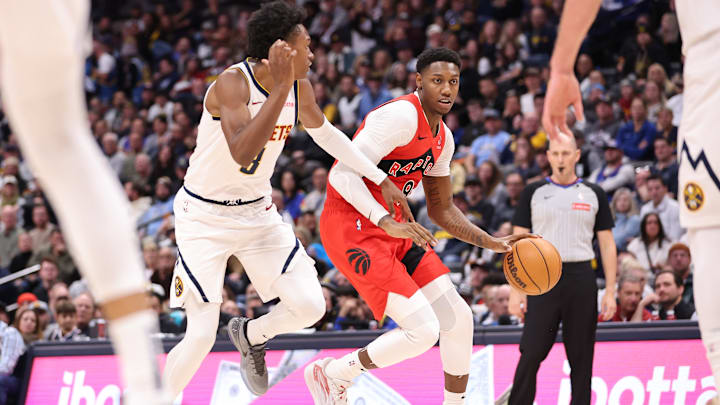It could be the perfect match for the Toronto Raptors, as they demonstrated in two recent games against the Denver Nuggets that they're well-equipped to compete with the former NBA champions. On October 28th at home, the Raptors pushed the Nuggets to overtime but ultimately lost to Jokic and company by a narrow 127-125 margin. In a road game on November 4, the Raptors picked up where they left off against the Nuggets, delivering another entertaining basketball matchup.
This whole sequence 🔥 pic.twitter.com/aacD4yJXrh
— Toronto Raptors (@Raptors) November 5, 2024
The November 4 matchup began on a high note for the Toronto Raptors, as they took advantage of the Nuggets' defensive struggles, forcing multiple turnovers and stifling Denver's momentum. However, as the game progressed into the second half, the Raptors' push for victory faltered. The Nuggets seized the opportunity, exploiting gaps in the Raptors' game and reversing the momentum.
The game came down to the wire, with the Raptors having a crucial opportunity to tie it in the final 15 seconds while trailing by just two points. Raptors forward RJ Barrett displayed impressive agility, leaving Nuggets player Peyton Watson on his knees and creating an open floater. However, Barrett was fouled before he could score, and the Nuggets still had a foul to give.
Barrett had a chance to tie on the final play, but Russell Westbrook's defense forced him into a desperate three-point attempt that narrowly missed. While there was arguable contact on the play, the Raptors lost to the Nuggets by just two points again. Analyzing this game more broadly reveals a persistent issue for Toronto: their poor performance in clutch situations.
That was painfully close to going in…
— Zulfi Sheikh (@zulfi_sheikh) November 5, 2024
Raptors lose 121-119 after getting out-executed late.
Five turnovers in the 4th, 3 in the final 3.5 mins and they fail to score in the last 90 seconds. Helluva game with lots to learn pic.twitter.com/rtdvKMD7iF
The Raptors’ lack of a reliable clutch performer has significant implications for the team's overall success. In close games, where every possession counts, teams with proven closers tend to have an advantage. Toronto has consistently ranked near the bottom of the league in clutch statistics, with notable exceptions in the 2018-19, 2019-20, and 2021-22 seasons.
The Raptors struggle to succeed in clutch situations
Over the years, former Raptors players have struggled in high-pressure situations, with Fred VanVleet and Pascal Siakam's shortcomings often leading this discussion.
VanVleet, recognized for his leadership and tenacity, faced frequent criticism for his late-game decision-making. In a similar vein, Siakam displayed moments of brilliance throughout his time with the Raptors but consistently struggled in high-pressure situations. Crunch time was a detriment to their games, as it ultimately expossed their lack of a "clutch gene" typically found in elite players.
The question looming over the Raptors is simple yet complex: how can they find a clutch player to solidify their late-game strategies? While the team has shown flashes of potential, the search for a consistent closer remains crucial. Scottie Barnes and RJ Barrett are talented players in their own right, but their ability to perform in clutch situations remains uncertain and can be inconsistent within their skill sets.
The emergence of another reliable scorer who can rise to the occasion when his team needs him most is arguably the more likely outcome. Could young Gradey Dick be the answer, considering his recent growth and improvements in his game? Perhaps Immanuel Quickley can distance himself from the BBQ trio and emerge as the primary scorer to lead his team to a gritty victory.
That said, there is no urgent need to find a clutch player at this moment, as the Toronto Raptors are focused on navigating their rebuild and developing their talent. All hope isn’t lost for players like Barrett and Barnes; they may very well find their stride and become the closers that Toronto desperately needs. For now, patience is essential for Raptors fans, even as memories of the team's troubled history in clutch situations loom large.
